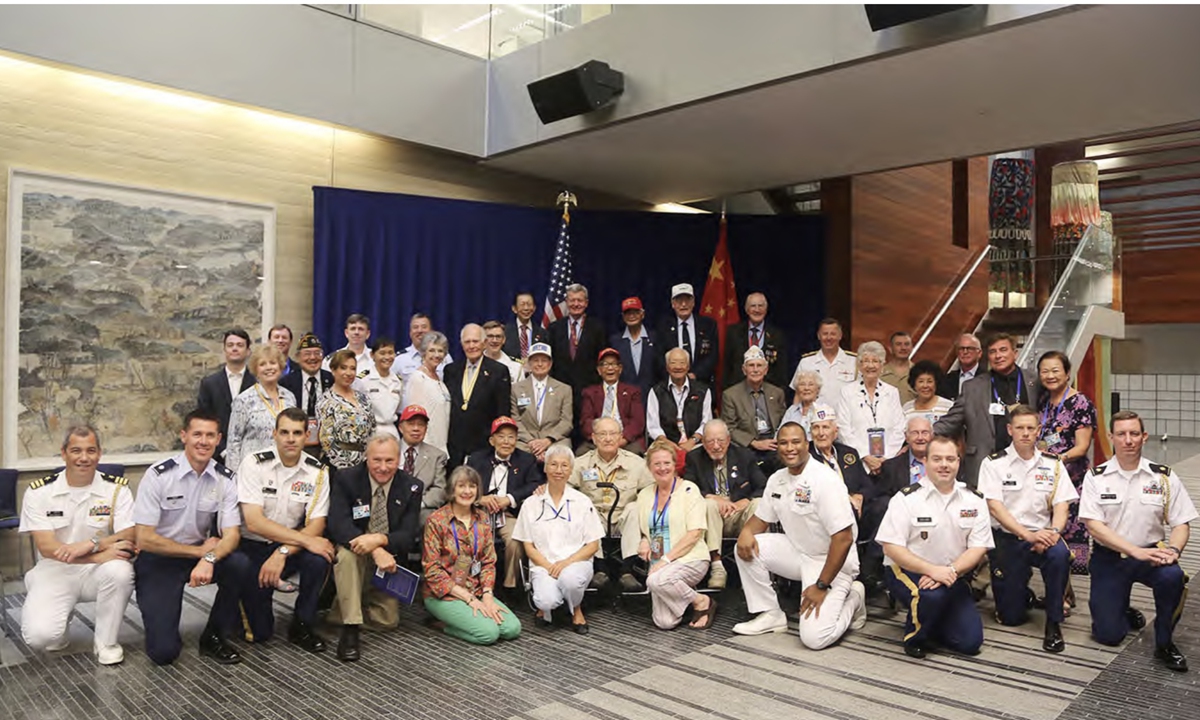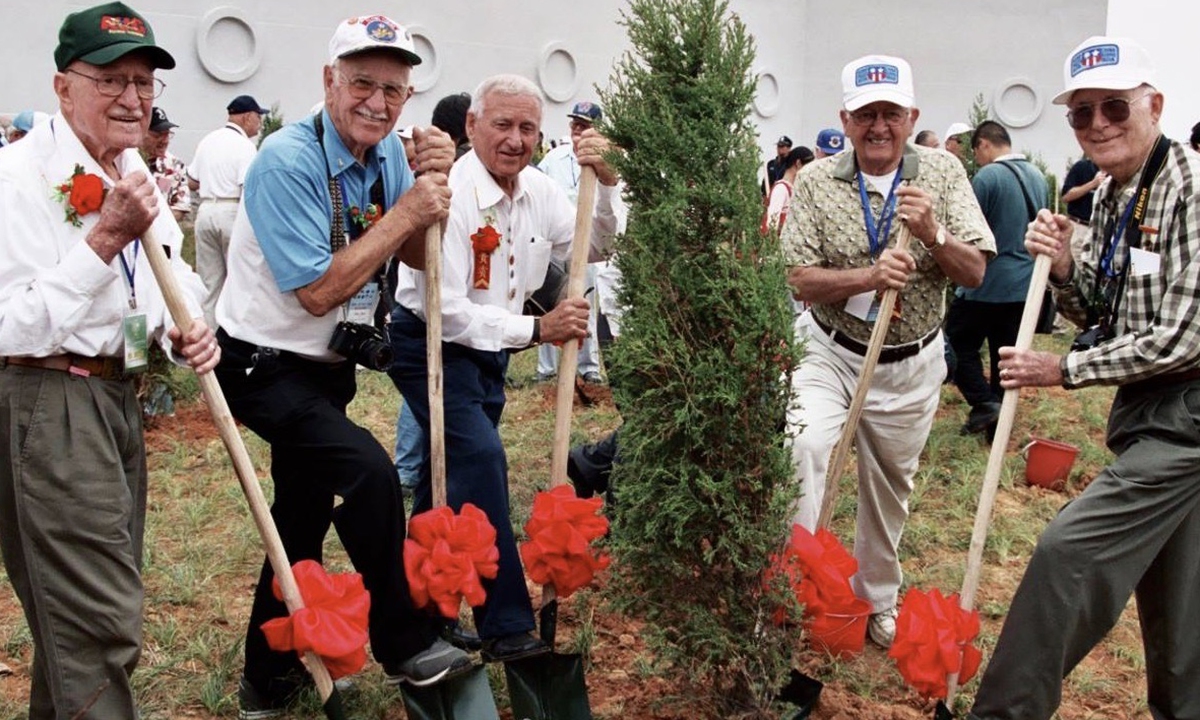Editor's Note:
Chinese people believe that letters are as valuable as gold. For thousands of years, letters, across mountains and oceans, have been delivering writers' sentiments and conveyed friendship and expectations.
Xi Jinping, general secretary of the Communist Party of China (CPC) Central Committee and Chinese president, has managed to find time to reply to some letters from different parts of society and the world despite his busy work schedule.
Through his letters, Xi has corresponded with international friends from all walks of life on numerous occasions, part of a series of excellent stories of China's international exchanges in the new era. The letters have also added vivid color to the diplomacy between China and other countries.
The Global Times traced and contacted some of the recipients of Xi's letters, to hear the inspiring stories behind the letters and their communication with the president.
In this installment, the Global Times spoke with Chairman of the Sino-American Aviation Heritage Foundation and a Flying tiger veteran who is 102 years old. Through the interviews, they not only shared their excitement of receiving the letter from Xi, but also illustrated some stories between the Flying Tiger and China, as well as why it is necessary to pass the spirit behind these stories.

Representative members of the Sino-American Aviation Heritage Foundation visit the US Embassy in China in September 2015. Photo: Courtesy of Jeffrey Greene
A recent letter from Chinese President Xi Jinping has once again emphasized the historical significance of the Flying Tigers and the enduring wartime friendship between the US and China. This historical perspective provides valuable insights into the lasting impact of this era on contemporary China-US relations.
Furthermore, the indomitable spirit of the Flying Tigers is poised to continue inspiring future generations. It serves as a testament to the unwavering determination of those who are committed to preserving and sharing these remarkable stories. They are resolute in their mission to ensure that the legacy of the Flying Tigers lives on, never to be forgotten.
Xi recently replied to a letter from Chairman of the Sino-American Aviation Heritage Foundation Jeffrey Greene and Flying Tigers veterans Harry Moyer and Mel McMullen.
In his reply on September 12, Xi said he hopes that the spirit of Flying Tigers will be carried on from generation to generation between the Chinese and American peoples.
"I was heartened by the great enthusiasm of the Sino-American Aviation Heritage Foundation and the veterans of Flying Tigers in letting more Chinese and Americans learn about the stories of the Flying Tigers over the years. Inspired by this, a growing number of young Americans have joined the Flying Tigers Friendship Schools and Youth Leadership Program, and nearly 500 Flying Tigers veterans and several hundred of their family members have visited China. I wish to pay tribute to you for all this," Xi wrote.
Salute from ChinaIn a thorough zoom interview with Global Times recently, Greene said that it was a "flabbergasted moment" when he heard back from Xi within only two weeks. "We are extraordinarily humbled that President Xi thought enough of the Flying Tigers. It shows his words, his belief that China never forgets its old friends."
"Having my name on a letter of the Chinese president is pretty impressive. It was very humbling to other two writers knowing that president of China is reaching out to them and also to their family members. They are so touched," Greene said.
In his letter, Xi said that "in the past, our two peoples fought the Japanese fascists together, and forged a deep friendship that withstood the test of blood and fire. In the future, the two major countries shoulder even more important responsibility for world peace, stability and development."
"We therefore should, and we must, respect each other, coexist in peace and pursue win-win cooperation," he said.
Noting that "in growing China-US relations, the hope lies in the people, the foundation lies among the people, and the future lies with the youth," Xi said that "a sound and steady development of the relationship in the new era requires the input and support of a new generation of Flying Tigers."
Recently, Greene, Moyer and McMullen jointly wrote a letter to Xi, in which they detailed the efforts of the foundation and Flying Tigers veterans in helping promote China-US friendly exchanges, and expressed their willingness to inherit and carry forward the precious spirit of China-US cooperation.
Following Greene's initial decision to write the letter, Harry Moyer joined in and was shocked as well when received Xi's reply in a quick manner. "To me, it was almost 'Earth Shattering' that he answered so quickly and so positively - his words clearly demonstrate that China indeed remembers its old friends," Moyer told the Global Times.

Flying Tigers veterans of the Sino-American Aviation Heritage Foundation plant a tree in 2005 when visiting Zhijiang, Central China's Hunan Province. Photo: Courtesy of Jeffrey Greene
Never to be forgottenThe friendship between the Flying Tigers veterans and the Chinese people has been inherited by the Chinese government and public over the years.
The Chinese Consulate General in San Francisco held a celebration marking the 102nd birthday of Flying Tigers veteran Harry Moyer on October 30, 2022. Video shows that Consul General of China in San Francisco Zhang Jianmin was playing the harmonica with Moyer's friends and singing "Happy Birthday."
In China, the story of the Flying Tigers is widely known and has become a fundamental part of many Chinese people's understanding of the US.
In 1941, a group of volunteer US pilots, later known as the Flying Tigers, came to China, standing shoulder to shoulder with the Chinese people to fight invading Japanese troops. They flew over the Himalayas, helping to ship strategic supplies to break through the Japanese blockade.
During their time in China, the Flying Tigers collectively achieved remarkable feats during their service, downing over 2,600 Japanese military aircraft, sinking or damaging 44 enemy ships, and contributing to the demise of more than 60,000 Japanese soldiers.
Moyer joined the US Army Air Force following the Japanese attack on Pearl Harbor. He is one of the few remaining WWII pilots and the only one believed to still be licensed to fly solo.
Moyer's squadron joined the 23rd Fighter Group of the 14th Air Force in China in 1944 and was primarily responsible for protecting Chinese airfields and the B-29 bombers tasked with counter-attacks on Japan.
"We, who were the pilots, the air crewmen who manned the bombers and transports, the ground crewmen who worked night and day to keep our aircraft flying and combat ready, were all young men, and the time we spent in helping the Chinese people defend their homeland and battling a tough and dangerous enemy was in many ways the biggest single experience of our lives," Moyer recalled.
"I was impressed with the remarkable determination of the Chinese people in their determination to resist the brutal military aggression of Imperial Japan. They suffered so much and they sacrificed so much in their resistance. Our memories of China and friendships made among her people has been in so many ways remained the defining experience of our lives," he said.
Founded in 1998, the Sino-American Aviation Heritage Foundation is an American civil friendship group aimed at promoting the study and commemoration of China-US historical aviation events. It is a nongovernmental US organization aimed at rekindling the spirit of cooperation between the two peoples and enhancing their friendship and understanding.
According to Greene, the foundation has received more than 1,000 photos provided by Flying Tigers veterans, which have been exhibited in three naval museums around the US. It has also brought 500 veterans and their family members to 25 cities around China, receiving a warm welcome from local Chinese communities.
Meanwhile, Greene's organization has enlisted the participation of three schools in the US and three in China for the Flying Tigers Friendship School and Youth Leadership Program. This initiative facilitates student exchanges between both countries through online classes and summer camps that have covered about 15,000 students in the two countries in total, according to Greene.
Greene said that many Americans know a few about what happened in China during the World War II. "They watch Top Gun and Band of Brothers, knowing about the European theatre, the Normandy, the Pearl Harbor… but there is not much work about the stories in China, such as the Nanjing Massacre," Greene said.
"So that is the mission of my foundation, both in the US and in China is to get people to scratch their heads and say, 'tell me more,'" he said.
Passing on the spiritThe history is fading into the distance with aging veterans gradually diminishing in number, but the story of the Flying Tigers remains vividly alive. Thanks to the dedicated efforts of individuals and organizations, such as Greene and his organization, the spirit of the Flying Tigers is poised to be carried forward by the next generation of young people in both China and the US.
Soon, with Greene's foundation, Flying Tigers veterans Moyer, who will turn 103 and McMullen, who will turn 99, will embark on a journey to China during which they will help to pass on the spirit of these heroic flyers to the next generation.
"If the youth remember it, they can use that memory," Greene said. "With the shared American and Chinese legacy of the Flying Tigers, the next generation of young people can do so much. We can do so much for relations between our countries. So much."
"It is so important to China and the US to have common, strong, calm and interest, which is also important to the whole world, because the relationship between China and the US is the most important relationship on the planet. And when it works, it will work for people of the two countries, and for the rest of the world," Greene said.
Before this reply letter to the Flying Tigers, Xi
also replied to a letter from the US-China Youth and Student Exchange Association and friends from all walks of life in the northwestern US state of Washington, as well as a letter from John Easterbrook, grandson of the late US General Joseph Stilwell.
In his replies, Xi expressed the hope that the peoples of both countries would strengthen communication, enhance understanding and expand cooperation, injecting new vitality into the development of bilateral relations.
Moyer said that because of the scope of our World War II cooperation and ultimate success as close allies, both countries can draw strength and inspiration by remembering what our cooperation and solidarity achieved during the darkest years of the war.
"We must keep the bond between the US and China alive, as it was forged in blood and honor," he said.





